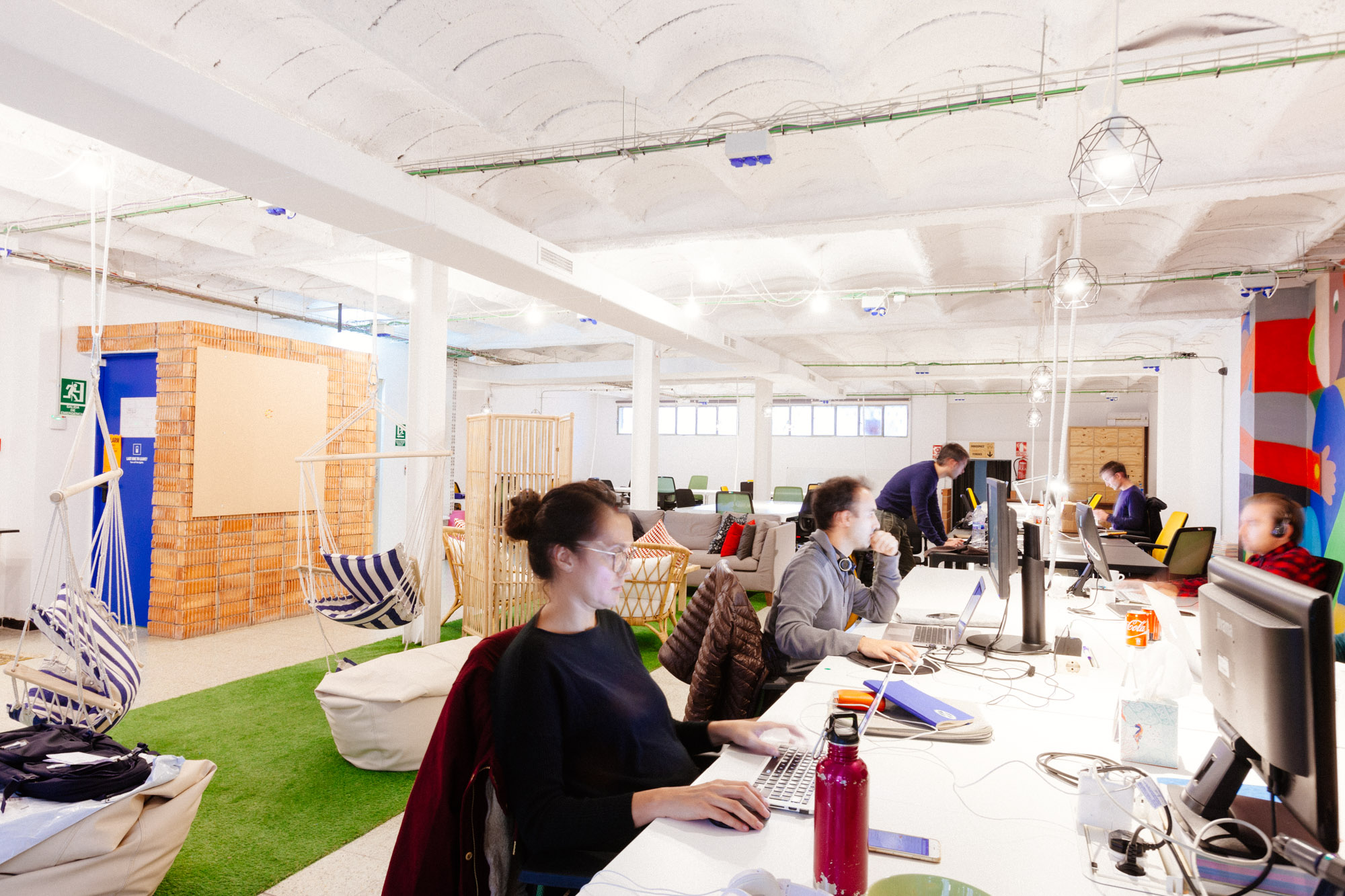Eric van den Broek, Sophie Ozdzinski, Stefano Borghi and Augustin Riedinger are co-founders of Copass, a marketplace that offers a selection of workspaces around the globe: vibrant or calm, huge or small, classic or atypical, they got everyone covered.
We have interviewed Eric van den Broek to find out more about trends in nomad coworking as well as in new group working patterns.
Can you introduce Copass, the philosophy behind it and how do you compete in such a “coworking platforms” dense environment?
Of course! Copass is a global coworking membership enabling its users to access a network of more than 950 independent coworking spaces around the globe with one single subscription. Basically, it’s like being a member of a thousand spaces at once.

Copass was born 6 years ago, in early 2013 as the brainchild of former coworking space founders. I’ve been involved in the coworking movement since 2011. In 2014, coworking was growing rapidly and what started as a genuine bottom-up movement started to get structured as a market. Big players started to join the movement with big money and were able to open networks of locations.
As I naturally became friends with many coworking space managers all over the world, we started discussing the possibility of offering a seamless experience for coworkers to work from any coworking space. The idea was the following: we could offer the value of a network to our members while staying independent at the same time. That’s basically how Copass started!
You were not alone on the market, were you?
In terms of competition, we’ve seen a lot of platforms come and go. Most listing platforms did fail as members would simply bypass the platform and deal directly with the space when they found it. Some competitors do work by focusing on meeting rooms and closed office spaces but that’s a very different audience. Copass stayed true to its roots by focusing on offering a seamless experience for coworkers and coworking space managers.
As we are self funded, we also could deal with a slower growth than what a VC funded company might expect. When we started, coworking was still pretty niche so the idea needed a little time to really make sense. Some say we’ve been patient but I would say we’ve been passionate.
You once said coworking leans towards “team consumption” instead of individual subscription. Can you elaborate?
I often think back about the old times when we had to explain 10 times a day what coworking actually is back in 2011. Nobody had even heard of it! Now if you walk in a random café and ask the question, most of the people know exactly what it is and what is the benefit of using one. Coworking has become mainstream, and as it became mainstream, it went way passed it’s initial target audience that was mostly made of freelancers.
Teams and companies could now have instant access to cool facilities and ecosystems anywhere they want without the burden of a formal lease. This change also reflects on Copass. Companies can create groups, attribute individual memberships to their teammates or share a pool of daypasses, centralizing all their coworking expenses in one place. The value of a network for this new audience is even greater than for individuals so Copass is an excellent fit for them. I would say that today, around 30% of checkins are done by teams.
Shall coworking spaces focus more on “teams” rather than individual freelancers, then?
It’s hard to answer this question as I think both approaches can be valid. Coworking Spaces focusing on freelancers can understand and answer their needs better. Community for freelancers is way more important than the actual facility as you’re talking to people who suffer from isolation when working from home. This isn’t so much the case for teams and companies. For them, the services and the facilities play a much bigger role. In a way, working with teams and companies is way more “transactional”.

In terms of community, teams usually don’t blend in as much as individuals as the team is “socially self sufficient”. In the early days of coworking, that was super community focused, this was actually a problem as too many teams in a space could affect the overall vibe of spaces and I remember having discussions with other operators on this very topic.
So I think freelancers and teams are actually two very different things. What happens is that, as coworking grew as a market and as the real estate pressure became stronger on space operators, coworking spaces needed to grow in size and to do so, they had to address different needs. Teams offer a more predictable income and working with teams is more “scalable” than working with freelancers as refining a service and a space design is easier done at scale than maintaining a unique community vibe.
I think freelancers and teams are actually two very different things.
The final answer would be: if you’re going into coworking for business and money, you should go big and find a way to accommodate teams within your space. If you’re going for the love of community, you might be able to go smaller and work only with freelancers. But there is no definite answer here.
From your data, it seems coworking users keep being more urban. Does it mean rural coworking remain an exception?
As much as I’d love to say no, I would have to agree on that. Coworking is still an urban phenomenon and there are many reasons for that:
- People feel the need for coworking spaces when they lack space at home. When you’ve got a 150sqm house in the countryside with your own office in it, you don’t feel the urge to get out as much as when you live in a 30swm flat in Paris
- To make sense from a financial point of view for a coworking space, you need a certain density of potential members around.
- As you’re going away from big cities, the economy is a lot less about services and a lot more about the industry or agriculture. 99% of coworkers are actually service providers.
That being said, in the long run, I could see a future where people move away from the cities and work remotely. I would actually love that as I think centralization causes many problems, but that’s a topic for another day 🙂
In the beginning, you were more focused on coworking travelers. Now, it seems Copass users tend more to cast their coworking need locally…
I think the so-called digital nomad lifestyle is for people a bit like sex for teenagers: many talk about it but few actually do it. Don’t get me wrong: I’ve been considered a Digital Nomad myself and I loved it. It’s just that looking at the media, it appears bigger than it actually is because it’s sexy and tickles people’s curiosity, especially when you’re stuck in a crappy office doing a job you don’t like and daydream everyday about quitting your job to go around the world 🙂

It’s true that Copass has been perceived a lot like a tool for nomads and I think we suffered from it as many people would think “this product is so cool but it’s not for me as as I don’t travel that much”. At the end, most of our users actually roam within the same city and sometime travel with Copass! For urbans, coworking is the new normal and as they have many options around, it makes a lot of sense for them to not commit to one but to use different spaces based on their needs. If you’ve got a meeting with a client at the other end of the city, it doesn’t make sense to go all the way back to your homespace.
The office, which was a constraint before, has become a tool and you can now use the best tool based on your needs and constraints.
Do you see big differences between countries in the way people interact with coworking?
I think in the end, what is the most striking are the similarities between spaces rather than the differences. From a sociological perspective, it’s very interesting to see that there is way more in common between a freelancer in a coworking space in New York City and in Indonesia than between this same freelancer and a farmer in minnesota. There is a global culture that emerged beyond countries which is a pretty unique phenomenon. You’ll still see some differences though but not that much.
How do you see the main coworking usage patterns and profiles evolve in the coming 2-5 years?
I see coworking as becoming a feature of almost anything. A lot of big real estate players already include coworking in their projects alongside restaurants and accommodation. Coworking has found a place in the real estate industry.
I’ve got mixed feelings about it and I know a lot of coworking pioneers also do. We came in this space and shaped the movement for the community and the values and not for selling square meters. The real estate part of it was only something we had to deal with. Let’s not fool ourselves: the intentions behind a WeWork or Spaces and an indy space are not the same…

That being said, there is no need to get too mad about it. That is the way things go and in a way, we all knew that was going to happen. Also, keep in mind that those big players address a different market I believe. For them, business comes down to flexibilizing the workspace, which is something companies need and have needed for a long time. When you’re creating a business, it all comes down to the problem you are solving. While pioneers in coworking solved the problem of isolation by creating communities, real estate players solve the problem of flexibility by offering office as a service.
Those two things are going to grow together, the latter being mechanically much bigger in size than the former.
Join Coworking Europe Conference for more insights, data and connections!


